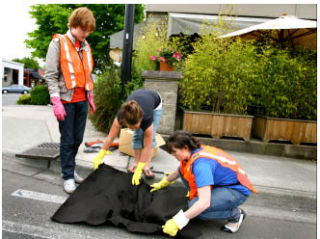Protected from grime by hot-pink gloves, and armed with a crowbar, Bainbridge High School student Robert Curran pried back the grate covering a Winslow Way stormwater drain. Curran, along with Natasha Hjerrild and Katherine Yagle, were getting grubby last week, fitting filters in downtown drains.
Signs embedded in the roadway beside the openings remind passersby that rains sweep pollutants and debris off the pavement, though stormwater pipes and into Eagle Harbor. But for a few dozen island drains the Earth Service Corps members act as gatekeepers for the bay, installing and maintaining filters that remove much of the chemicals and nutrients that make runoff a major contributor of pollution in Puget Sound.
Using Associated Student Body funds, the club has been quietly performing the service for years. But this spring they’re spreading the word about their program in the hopes that a larger organization, ideally the city, will take on the challenge and begin stormwater filtration on a grander scale.
“The basis is that we’re putting school funds into something that probably should be covered by the city,” Hjerrild said.
With a $1,000 ASB funds budget, Earth Services Corps places filters on only a small fraction of island drains.
The club purchases “grate mates,” cloth, sack-like filters that fit into the mouths of drains, for about $100. For slightly less, it also buys a mesh filter that floats in the stormwater and uses absorbent pellets to soak up chemicals, but they are less effective.
Luckily few of the club’s other activities require funds, so most of the money it is allocated can be devoted to stormwater filters.
The filters are not reusable and are supposed to be changed every few months, especially in heavily used drains like those in Winslow. But club members change the filters whenever they have the time and money.
Earth Service Corps members hope the city will take advantage of Department of Ecology water quality grants, which have application deadlines in the fall, to bring in money for stormwater filtration.
Since 2006 the city has been working to bring its Surface and Stormwater Management Program into compliance with forthcoming state regulations for municipal stormwater.
The island’s stormwater system incorporates over 130 miles of open ditches, 20 miles of storm drain and sewer pipe, 500 catch basins and 175 outlets into the sound.
The Deparment of Ecology lists stormwater as a leading threat to Puget Sound. Rainwater that falls on impervious surfaces like pavement and rooftops is not filtered through soil and vegetation. Instead, it scours off automotive oils, fertilizers, bacteria and soils and carries it into streams, or more often on Bainbridge, into Puget Sound.
Regional efforts to curb runoff are focused on reducing impervious surfaces in new development and the integration of porous materials that return fresh water to aquifers rather than the sound.
The roughly 40 Earth Service Corps members realize their filters act as Band-Aids for an overwhelmingly large problem. But the stormwater project has given them hands-on experience addressing a pressing environmental concern.
“It’s kind of dirty work, but it’s fun and rewarding,” Earth Service Corps member Anya Eber said. “This is a club where you actually spend your time working.”
But club members will have no problem staying busy, even if they relinquish the stormwater program.
The club manages recycling programs, helps pull invasive weeds like English ivy and was recently awarded a $10,000 grant to begin a composting program at the schools.
Stomwater is simply a project the club feels would be better handled by an organization with deeper pockets.
“We have a bunch of kids and they’re very motivated, but we can’t cover the whole island,” Eber said. “The problem is just too big.”


